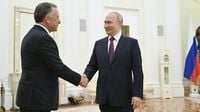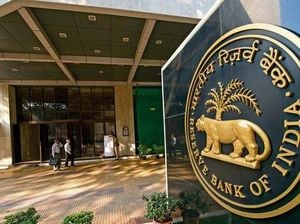The United States is facing a complex diplomatic landscape as tensions between Russia and Ukraine continue to escalate. On April 25, 2025, Russian Foreign Minister Sergey Lavrov stated in an interview with CBS that the Kremlin is prepared to sign a peace agreement with Ukraine, although he noted that certain details still need to be addressed. This announcement comes amid ongoing negotiations facilitated by former President Donald Trump’s special envoy, Steve Witkoff, who met with Russian President Vladimir Putin in Moscow for approximately three hours on the same day.
During their meeting, Witkoff and Putin reportedly aligned their positions on various international issues, including the ongoing conflict in Ukraine. Yuri Ushakov, a senior advisor to Putin, emphasized that the discussions brought the two sides closer together. Notably, the last direct negotiations between Russia and Ukraine occurred during unsuccessful talks in Turkey in early 2022.
As the diplomatic talks unfolded, a significant event occurred back in Russia. A car bomb exploded outside Moscow, killing Yaroslav Moskalik, the deputy head of the Main Operations Directorate of the Russian General Staff. This incident marks the second assassination of a high-ranking Russian general in recent months, further complicating the already tense atmosphere surrounding the conflict.
In the backdrop of these developments, Lavrov defended Russia's military actions in Ukraine, claiming that Russian forces are targeting only military objectives and civilian structures used by the military. However, this assertion stands in stark contrast to reports of civilian casualties from recent attacks, including a drone strike that killed at least three people in Pavlograd, Ukraine.
Trump’s proposal for a peace deal includes a freeze in hostilities, in which Ukraine would recognize Russia’s annexation of Crimea and reject NATO membership. This approach has raised concerns among Ukrainian officials, who have consistently refused to cede territory to Moscow. Ukrainian President Volodymyr Zelensky has expressed frustration about the lack of pressure from the West on Russia, particularly in light of the recent escalation in violence.
Putin's insistence on Ukraine's disarmament and the Kremlin's ongoing military buildup indicate that a definitive peace may be far from reach. The Russian president has hinted at further rearmament and has met with arms manufacturers to discuss increasing military production, a move that suggests he is not ready to halt military operations.
In a parallel development, Witkoff's negotiations have also revealed a stark contrast between U.S. and European approaches to the conflict. Leaked documents indicate that the U.S. is more willing to concede territory to Russia than European nations, which have maintained a firm stance on Ukraine's territorial integrity. The American proposal includes recognizing Russian control over Crimea and lifting sanctions against Moscow, while European officials have pushed back against any concessions.
As the talks continue, the situation remains precarious. While Trump has publicly expressed optimism about reaching a deal, he has also stated that he would not hesitate to walk away from negotiations if substantial progress is not made. This ultimatum adds pressure on both sides to come to an agreement, but with the backdrop of ongoing violence, the path to peace remains fraught with challenges.
Analysts have pointed out that any agreement reached under current circumstances would likely be viewed as a tactical maneuver by Moscow, aimed at solidifying its control over occupied territories rather than a genuine effort to achieve lasting peace. Tatiana Stanovaya, a Russian political scientist, noted that Putin appears convinced that Ukraine cannot uphold any commitments made under such an agreement, especially given the ongoing Western military support for Kyiv.
Furthermore, Russian officials have made it clear that they will not accept the presence of international peacekeeping troops in Ukraine, a point that has been echoed by the United Kingdom, which has reconsidered the deployment of its forces due to the high risks involved.
As the international community watches closely, the stakes are high. The potential for further escalation looms large, particularly as Russia continues its military operations and Ukraine seeks to defend its sovereignty. The coming days will be critical in determining whether diplomacy can prevail over conflict, or if the situation will devolve into further violence.
In summary, while the possibility of a peace agreement exists, the complexities of the situation—ranging from military actions to geopolitical strategies—make it increasingly challenging to envision a resolution that satisfies both parties. The world remains on edge as it awaits the outcome of these pivotal negotiations.




